|
|
|
Sort Order |
|
|
|
Items / Page
|
|
|
|
|
|
|
| Srl | Item |
| 1 |
ID:
148151
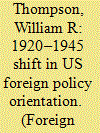

|
|
|
|
|
| Summary/Abstract |
Grand strategy change analyses exhibit problems in balancing the interaction among ideas, external structures and developments, and domestic politics. An alternative theory is constructed that combines the correspondence between external problems and capability, shocks, political entrepreneurship, domestic politics, and reinforcement. The essence of the theory is that strategic shifts are more probable and likely to persist to the extent that more of these components involve significant changes. The 1920–1945 system leader puzzle – why the United States abstained from ascending to the system leader position in 1920 but not in 1945 – is used as an illustration of the theory's explanatory utility.
|
|
|
|
|
|
|
|
|
|
|
|
|
|
|
|
| 2 |
ID:
148157
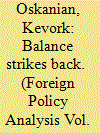

|
|
|
|
|
| Summary/Abstract |
Tbilisi’s recent foreign policy presents analysts working from a balance-of-power perspective with something of a puzzle: with Russia very much the regionally dominant power, against the predictions of structural-systemic theories, small state Georgia has ended up balancing against, rather than bandwagoning with, great power Moscow. As a result, domestic, ideological explanations that implausibly ignore or minimize interstate considerations of power have predominated in analyses of Tbilisi’s foreign policy. In response, this essay examines Georgia’s post-Soviet foreign policies from a neoclassical realist theoretical viewpoint, combining systemic, balance-of-power and domestic ideological factors: throughout the period under review, Tbilisi’s policies were thus due to ideologically conditioned perceptions of shifting power-political realities in its neighborhood, with an ideological adherence to liberal norms playing a particularly important role in distorting these perceptions during the Saakashvili administration. Through this combination of power and ideology, neoclassical realism ends up providing a more comprehensive and continuous account of Tbilisi’s shifting policies since 1992 than either domestic or alternative realist frameworks, like balance-of-threat theory, or omnibalancing; as an important implication, Georgia’s, and other former Soviet states’ continued pro-Western orientation will depend as much on their perceptions of the West’s continued commitment to regional power projection as on domestic ideological preferences.
|
|
|
|
|
|
|
|
|
|
|
|
|
|
|
|
| 3 |
ID:
148153
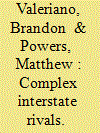

|
|
|
|
|
| Summary/Abstract |
The goal of this article is to engage the concept of rivalry, analyze its possible deficiencies, and empirically identify which groups of states make up what we call complex rivals. A complex rivalry is defined as a group of at least three states whose relationships are linked by common issues, alignments, or dispute joiner dynamics in which there is a threat of militarized conflict and includes persistent long-term interactions and collective animosity. Once the cases that make up complex rivals are described, we examine the dynamics of conflict within complex rivalries. We show that complex rivals tend to follow a different path to war when compared to dyadic rivals in that they experience more war on average, are more likely to include major powers, and fight predominately over positional as opposed to spatial concerns.
|
|
|
|
|
|
|
|
|
|
|
|
|
|
|
|
| 4 |
ID:
148155
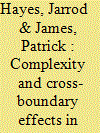

|
|
|
|
|
| Summary/Abstract |
If one trend characterizes the study of foreign and security policy over the past several decades, it may be the search for concepts that assist in addressing the complexity of global politics.2 We embrace that complexity and reimagine security as a social phenomenon that interweaves between social collectives, bleeding across boundaries and tying collectivities together as they seek to reconcile different systems of security meaning-making. At its core, security is a socially constructed system for making sense of danger and threat (Buzan et al. 1998). Thinking about security as a phenomenon of linked social constructions opens the field of inquiry up to a massive amount of complexity and interactivity. We offer two concepts as a possible basis for thinking about the ways in which security systems interact with and influence the operation of other security systems: multidirectionality and anticipated reaction.
|
|
|
|
|
|
|
|
|
|
|
|
|
|
|
|
| 5 |
ID:
148158


|
|
|
|
|
| Summary/Abstract |
This article addresses how transnational groups affect the security relationship between the states they reside in. I argue that this is determined by the differential threat perceptions of the host states. If the host states both consider the group to be a threat, the group is a shared problem and policy toward the group becomes an arena for cooperation for the two states. However, if one state views the group as a threat and the other does not, policy toward the group becomes an arena for conflict between them. I test this hypothesis with a comparative case study analysis of Turkey's relationships with the United States, Syria, and Iran vis-à-vis the Kurds after the United States’ invasion of Iraq in 2003.
|
|
|
|
|
|
|
|
|
|
|
|
|
|
|
|
| 6 |
ID:
148154
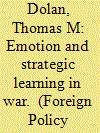

|
|
|
|
|
| Summary/Abstract |
This paper applies the framework of affective intelligence theory—a theory of how emotions affect attitudes, beliefs, and decision making—to elite learning during war time. Doing so provides novel hypotheses about when and how war leaders respond to new events. These hypotheses are tested using a set of cases drawn from the Winter War. Findings suggest that these emotion-derived hypotheses may be more effective in predicting learning and its absence than purely Bayesian or extant cognitive models of learning.
|
|
|
|
|
|
|
|
|
|
|
|
|
|
|
|
| 7 |
ID:
148150
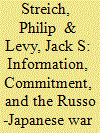

|
|
|
|
|
| Summary/Abstract |
We apply a modified version of the bargaining model of war to the outbreak of the Russo-Japanese War of 1904–1905. We conceptualize the informational path to war as a two-step process, the first identifying the sources of informational asymmetries, and the second specifying the causal linkages between informational asymmetries and war. The sources of informational asymmetries include not only private information and incentives to misrepresent that information, but also individual, societal, and governmental-level factors. We argue that the primary causes of the Russo-Japanese War involved a combination of the commitment problem and preventive logic arising from Russia's growing power relative to that of Japan, and informational problems arising from disagreements about relative power and resolve. These disagreements arose almost exclusively from Russian political and military leaders' underestimation of Japanese capabilities and resolve, and they generated highly intransigent Russian bargaining behavior. Russia misperceptions can be traced primarily to racial and cultural stereotypes and psychological biases, and to competition between rival domestic and bureaucratic factions that distorted information flows, created an incoherent decision-making process, and sent confusing signals to Japan.
|
|
|
|
|
|
|
|
|
|
|
|
|
|
|
|
| 8 |
ID:
148159


|
|
|
|
|
| Summary/Abstract |
We analyze how the deployment of US troops affects host-state defense spending. We test this relationship, from 1951 to 2003, by examining how the deployment of US military forces impacts defense spending in different types of states, including US allies, NATO members, non-allies of the United States, and all states. We also utilize spatial measures of US troop deployments to analyze how regional and neighborhood concentrations of forces shape host-state policies. Using both traditional panel methodology, and incorporating a simultaneous equation model for the deployment of troops, we find that non-allied states tend to decrease their defense burden when the United States places troops within their borders. However, NATO allies consistently increase their defense burden in response to the presence of US troops within their borders. Additionally, most states tend to increase spending when the United States places troops near their borders.
|
|
|
|
|
|
|
|
|
|
|
|
|
|
|
|
| 9 |
ID:
148152


|
|
|
|
|
| Summary/Abstract |
Approximately one-third of all interstate conflicts are multilateral, with the majority of these having a coalition of states fighting on at least one side. Despite the frequency of coalition wars, coalitions have not received much attention within the conflict literature. This paper presents the first general study on the effectiveness of coalitions during interstate wars. While there are many drawbacks to fighting as part of a coalition, the benefits of cooperation outweigh the cost, making coalitions more likely to win wars. An empirical examination of war outcomes between 1816 and 2007 confirms this hypothesis; coalitions have greater odds of victory than states fighting outside a coalition. This finding holds after controlling for possible endogeneity and selection bias.
|
|
|
|
|
|
|
|
|
|
|
|
|
|
|
|
| 10 |
ID:
148156
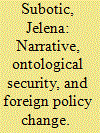

|
|
|
|
|
| Summary/Abstract |
While the recent IR “narrative turn” has greatly improved our understanding of how narratives influence state policy choices, we need to deepen our understanding of how narratives explain policy change. If state “autobiographies” provide such powerful explanations of why states do what they do, how can they change their policies and practices? To understand the relationship between policy change and state narrative continuity, I build on existing scholarship on narrative analysis and ontological security to examine ways in which state autobiographical narratives are used by political actors to confront state insecurities. My principal argument is that at times of great crises and threats to multiple state securities (physical, social, and ontological), narratives are selectively activated to provide a cognitive bridge between policy change that resolves the physical security challenge, while also preserving state ontological security through offering autobiographical continuity, a sense of routine, familiarity, and calm. I illustrate the argument with an analysis of Serbia's changing foreign policy behavior regarding the disputed status of Kosovo.
|
|
|
|
|
|
|
|
|
|
|
|
|
|
|
|
| 11 |
ID:
148160
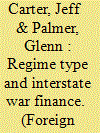

|
|
|
|
|
| Summary/Abstract |
Governments can finance the higher military spending associated with interstate war through a combination of cutting nonmilitary spending, imposing higher taxes, borrowing, and adopting an inflationary monetary policy. We argue that the incentives of survival-motivated leaders influence the strategies governments use to fund their war efforts and that regime type conditions the use of some finance strategies. Consistent with our expectations, we find that fighting an interstate war is associated with greater reductions in nonmilitary spending in dictatorships than in democracies and that contemporary democracies and dictatorships have largely avoided financing their wars through tax increases and inflation. We find little support for the argument that democracies finance their interstate wars through greater debt than nondemocracies.
|
|
|
|
|
|
|
|
|
|
|
|
|
|
|
|
|
|
|
|
|